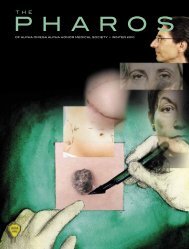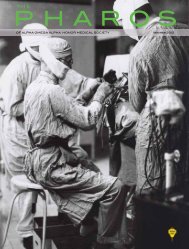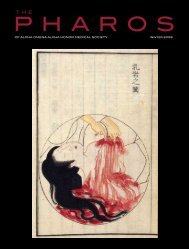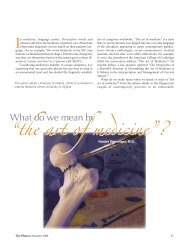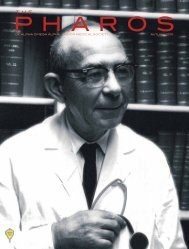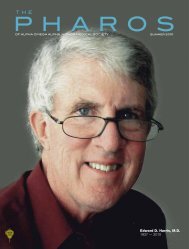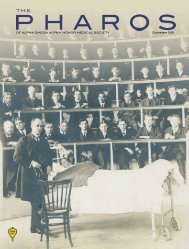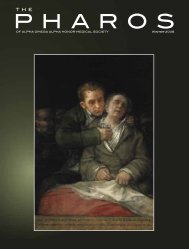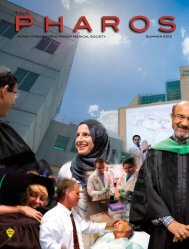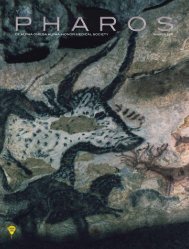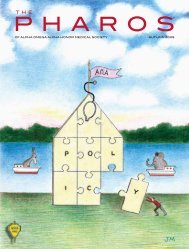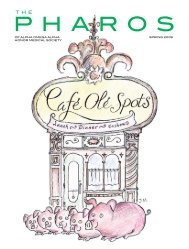The Pharos - Alpha Omega Alpha
The Pharos - Alpha Omega Alpha
The Pharos - Alpha Omega Alpha
You also want an ePaper? Increase the reach of your titles
YUMPU automatically turns print PDFs into web optimized ePapers that Google loves.
Whittling: <strong>The</strong> Last Class<br />
Dean Gianakos, MD, FACP<br />
<strong>The</strong> author is associate director of the Lynchburg Family<br />
Medicine Residency in Lynchburg, Virginia. He is a member<br />
of the editorial board of <strong>The</strong> <strong>Pharos</strong>.<br />
Dr. Stone was also a member of the editorial board of <strong>The</strong><br />
<strong>Pharos</strong>. He died in 2008.<br />
A GOOD poet is someone who manages, in a lifetime of<br />
standing out in thunderstorms, to be struck by lightning five<br />
or six times; a dozen or two times and he is great.<br />
—Randall Jarrell 1<br />
In November 2003, the president of the Lynchburg<br />
Academy of Medicine invited Dr. John Stone to speak<br />
to our medical community. He was familiar with Dr.<br />
Stone’s work as a cardiologist and poet, and he had an ulterior<br />
motive—he wanted to improve his own writing skills. He<br />
arranged for Dr. Stone to conduct a writing seminar for physicians<br />
interested in writing, to be followed by an evening talk<br />
on poetry and medicine. I was one of four physicians gathered<br />
around a small table in a hospital conference room to hear Dr.<br />
Stone speak about his craft.<br />
Walking to the seminar through the parking lot, I watched<br />
as Dr. Stone stopped to admire the gingko trees that lined<br />
the hospital drive, bright gold in late fall. 2 Those moments in<br />
the parking lot were the most memorable of the day. I recall<br />
how he suddenly stopped, looked around, and asked me if I<br />
had ever noticed the trees. I said, no, I really hadn’t. But I did<br />
then. After looking closely at the trees, I paused, and then<br />
took a good look at him. I noticed his gray beard, slightly<br />
hunched back, and bulging stomach. Who was this man in a<br />
light brown jacket, standing in the middle of a doctor’s parking<br />
lot in Central Virginia on a cold fall day, turning in every<br />
direction to examine gingko trees as cars and doctors passed<br />
by? He notices things, I said to myself. He is easily awed. He<br />
later showed me his poem about gingkos and scribbled a line<br />
of poetry in my copy of one of his books.<br />
During the seminar, Dr. Stone read poems by William<br />
Carlos Williams. His clear, mesmerizing voice reminded me<br />
of the importance of reading poetry aloud. He read his own<br />
poems. He talked about the medical practice and writing<br />
life of William Carlos Williams. He fondly recalled a visit to<br />
Williams’ home in Rutherford, New Jersey. He gave rules and<br />
suggestions for writing poetry: Write it down. Get out of bed.<br />
Get a job! Make every adjective earn its way. And most importantly:<br />
Know what to leave out.<br />
Since that afternoon, I have enjoyed reading and discussing<br />
Dr. Stone’s poems, particularly those related to medicine. I frequently<br />
use “Talking to the Family” and “Death” when teaching<br />
residents about breaking bad news or coping with loss.<br />
I’m always on the hunt for new poems that offer insights<br />
into the art of doctoring. Not long ago, Garrison Keillor<br />
published in the Writer’s Almanac, his electronic newsletter,<br />
<strong>The</strong> <strong>Pharos</strong>/Autumn 2012<br />
What has been written<br />
about whittling<br />
is not true<br />
most of it<br />
It is the discovery<br />
that keeps<br />
the fingers moving<br />
not idleness<br />
but the knife looking for<br />
the right plane<br />
that will let the secret out<br />
Whittling is no pastime<br />
he says<br />
who has been whittling<br />
In spare minutes at the wood<br />
of his life for forty years<br />
Three rules he thinks<br />
have helped<br />
Make small cuts<br />
In this way<br />
you may be able to stop before<br />
what was to be an arm<br />
has to be something else<br />
Always whittle away from yourself<br />
and toward something.<br />
For God’s sake<br />
and your own<br />
know when to stop<br />
Whittling is the best example<br />
I know of what most<br />
may happen when<br />
least expected<br />
bad or good<br />
Hurry before<br />
angina comes like a pair of pliers<br />
over your left shoulder<br />
<strong>The</strong>re is plenty of wood<br />
for everyone<br />
and you<br />
Go ahead now<br />
May you find<br />
in the waiting wood<br />
rough unspoken<br />
what is true<br />
or<br />
nearly true<br />
or<br />
true enough. 3



